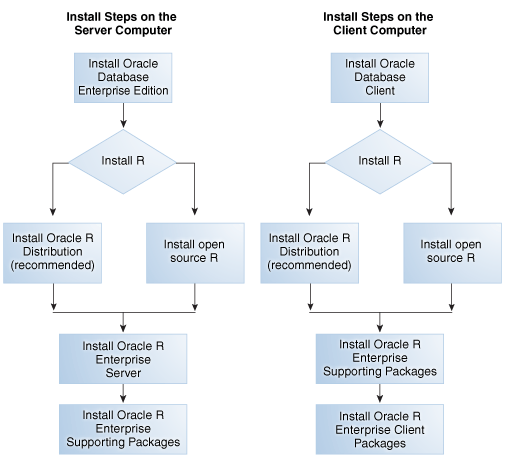Oracle
R Enterprise Server Overview
Oracle R Enterprise includes several
components on the server. Together these components enable an Oracle R
Enterprise client to interact with Oracle R Enterprise Server.
The server-side components of Oracle
R Enterprise are:
- Oracle Database Enterprise Edition (64bit)
- Oracle R Distribution or open source R
- Oracle R Enterprise Server
Oracle R
Enterprise Server consists of the following:
- The rqsys schema
- Metadata and executable code in sys
- Oracle R Enterprise Server libraries in $ORACLE_HOME/lib (Linux and UNIX) or %ORACLE_HOME%\bin (Windows)
- Oracle R Enterprise R packages in $ORACLE_HOME/R/library (%ORACLE_HOME%\R\library on Windows)
Oracle R Enterprise Server Requirements
Before installing Oracle R Enterprise Server, verify your system environment, and ensure that your user ID has the proper permissions.
Oracle R Enterprise runs on 64-bit platforms only.
·
Linux x86-64
·
Oracle Solaris
·
IBM AIX
·
IBM AIX
Oracle Database must be installed and configured as
described
·
Oracle R Enterprise requires the 64-bit version
of Oracle Database Enterprise Edition.
Installing Oracle R Enterprise Server
verify if ORACLE_HOME, ORACLE_SID, R_HOME,
PATH, and LD_LIBRARY_PATH environment variables are properly set. For
example, you could specify values like the following in a bashrc file:
export
ORACLE_HOME=/u01/app/oracle/product/12.1.0.2/dbhome_1
export
ORACLE_SID=ORCL
export
R_HOME=/usr/lib64/R
export
PATH=$PATH:$R_HOME/bin:$ORACLE_HOME/bin
export
LD_LIBRARY_PATH=$LD_LIBRARY_PATH:$ORACLE_HOME/lib:$R_HOME/lib
Download Oracle R Enterprise Server
Go to the Oracle R Enterprise home page on the Oracle Technology Network:.http://www.oracle.com/technetwork/database/options/advanced-analytics/r-enterprise/
Select Oracle R Enterprise Downloads. On the Downloads page, select Oracle R Enterprise Server and the Supporting Packages for Linux. The following files are downloaded for Oracle R Enterprise 1.4.1.
ore-server-linux-x86-64-1.4.1.zip
ore-supporting-linux-x86-64-1.4.1.zip
$ dcli -g nodes -l oracle mkdir -p /home/oracle/ORE
$ dcli -g nodes -l oracle -f ore-server-linux-x86-64-1.4.1.zip -d
/home/oracle/ORE/ore-server-linux-x86-64-1.4.1.zip
$ dcli -g nodes -l oracle -f ore-supporting-linux-x86-64-1.4.1.zip -d
/home/oracle/ORE/ore-supporting-linux-x86-64-1.4.1.zip
$ dcli -t -g nodes -l oracle unzip
/home/oracle/ORE/ore-supporting-linux-x86-64-1.4.1.zip -d
/my_destination_directory/
$ dcli -t -g nodes -l oracle "cd /my_destination_directory; ./server.sh -y
--admin --sys syspassword --perm permtablespace
--temp temptablespace --rqsys rqsyspassword
--user-perm usertablespace --user-temp usertemptablespace
--pass rquserpassword --user RQUSER"
Installing Oracle R Enterprise Server interactively:
$ ./server.sh -i
Oracle R Enterprise 1.4.1 Server.
Copyright (c) 2012, 2014 Oracle and/or its affiliates.
All rights reserved.
Checking platform .................. Pass
Checking R ......................... Pass
Checking R libraries ............... Pass
Checking ORACLE_HOME ............... Pass
Checking ORACLE_SID ................ Pass
Checking sqlplus ................... Pass
Checking ORACLE instance ........... Pass
Checking CDB/PDB ................... Pass
Checking ORE ....................... Pass
Choosing RQSYS tablespaces
PERMANENT
tablespace to use for RQSYS [list]: DATA
TEMPORARY
tablespace to use for RQSYS [list]: TEMP1
Choosing RQSYS password
Password to use
for RQSYS:
Choosing ORE user
ORE user to use
[list]:
ORE user to use [list]: OREUSER1
Current configuration
R Version
........................ Oracle Distribution of R version 3.1.1 (--)
R_HOME
........................... /usr/lib64/R
R_LIBS_USER
...................... /u01/app/oracle/product/12.1.0.2/dbhome_1/R/library
ORACLE_HOME
...................... /u01/app/oracle/product/12.1.0.2/dbhome_1
ORACLE_SID
....................... OFSAPRD1
Existing R
Version ............... None
Existing R_HOME
.................. None
Existing ORE data
................ None
Existing ORE code
................ None
Existing ORE
libraries ........... None
RQSYS PERMANENT
tablespace ....... DATA
RQSYS TEMPORARY
tablespace ....... TEMP1
ORE user type
.................... Existing
ORE user name
.................... OREUSER1
ORE user
PERMANENT tablespace .... DATA
Grant RQADMIN
role ............... No
Operation
........................ Install/Upgrade/Setup
Proceed? [yes] y
Removing R libraries ............... Pass
Installing R libraries ............. Pass
Installing ORE libraries ........... Pass
Installing RQSYS data .............. Pass
Configuring ORE .................... Pass
Installing RQSYS code .............. Pass
Installing ORE packages ............ Pass
Creating ORE script ................ Pass
Installing migration scripts ....... Pass
Installing supporting packages ..... Pass
Granting ORE privileges ............ Pass
Done
References:
